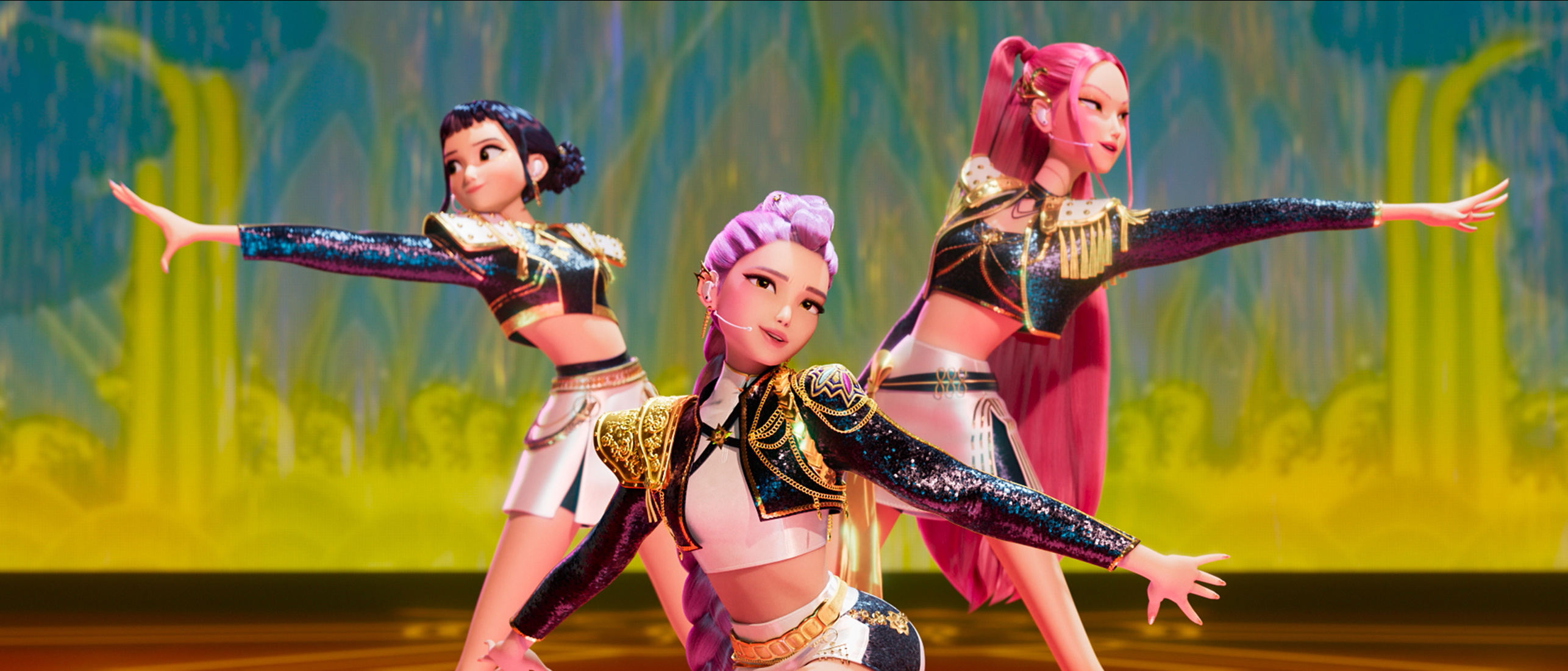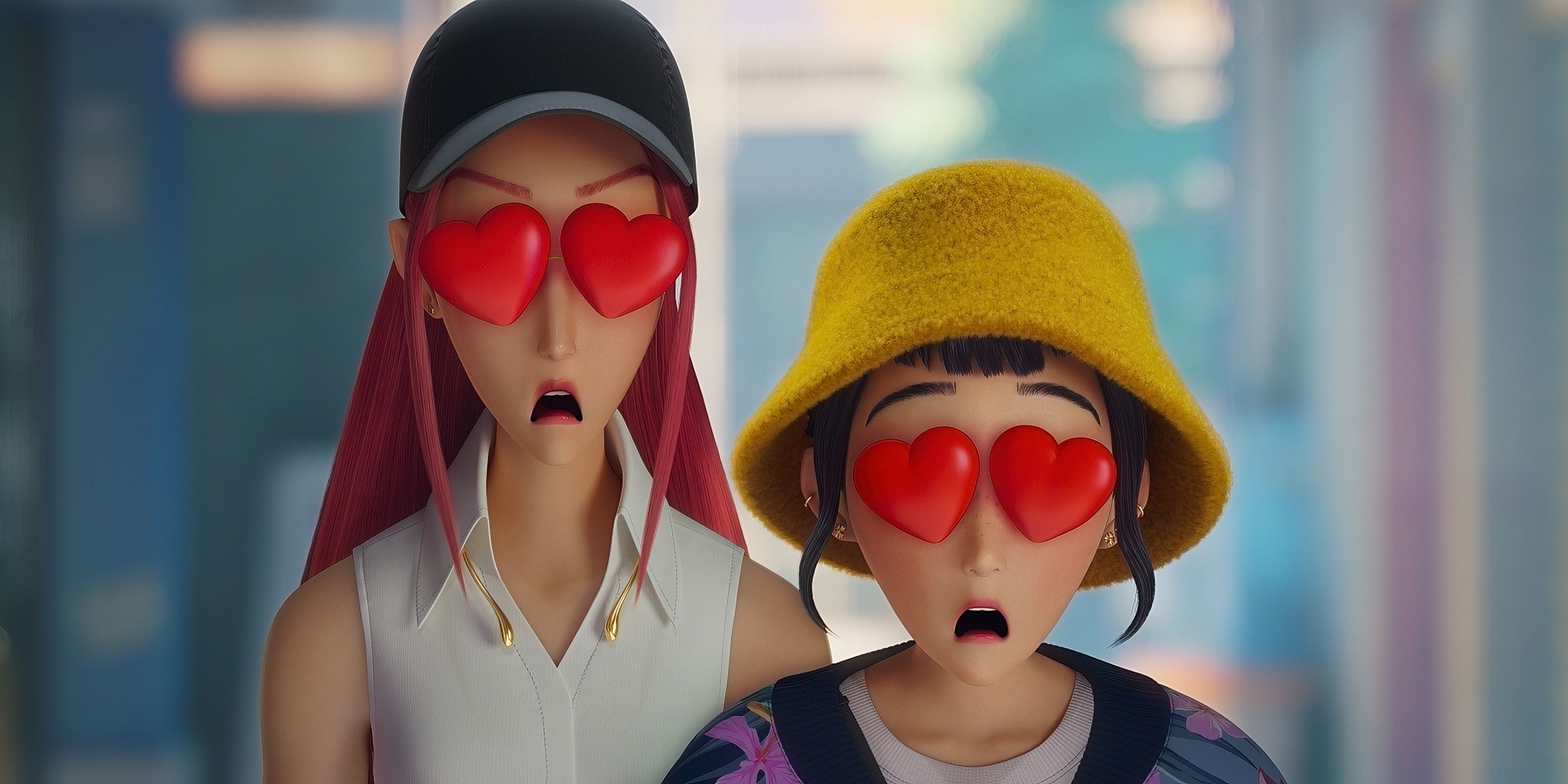Directors: Maggie Kang, Chris Appelhans
Writers: Hannah McMechan, Danya Jimenez, Maggie Kang, Chris Appelhans
Stars: Arden Cho, Ahn Hyo-seop, Ji-young Yoo
Synopsis: When they aren’t selling out stadiums, Kpop superstars Rumi, Mira and Zoey use their secret identities as badass demon hunters to protect their fans from an ever-present supernatural threat. Together, they must face their biggest enemy yet – an irresistible rival boy band of demons in disguise.
Did I have any expectations for the direct-to-Netflix KPop Demon Hunters? Absolutely not. In fact, I had only heard of this movie just a few weeks ago, shocked that it was produced by Sony Pictures Animation, and dumped on Netflix, thinking we had moved past this and that this entity of Sony Pictures would resume releasing their library theatrically. Yet, some part of me felt that this production could be as worthwhile as The Mitchells vs. The Machines and Vivo, which were both unceremoniously dumped on the streaming service but became massive hits during the COVID-19 pandemic. And while KPop Demon Hunters doesn’t reach the same heights as those movies, it’s at least aesthetically exciting and thematically cogent enough to at least warrant a recommendation.

This year, the animated landscape has been more than lacking. With the exception of the incredible Ne Zha 2 and Dog Man, many families have been left hanging as to when the next must-see offering will be released. Granted, audiences will have the chance to see Elio this week as well, but we’ve not had something genuinely creative from Hollywood in this medium of filmmaking in a long time, so much so that a small independent production from Latvia was able to beat the Pixar and Dreamworks of this world at this year’s Oscars.
KPop Demon Hunters may not flow as easily as Gints Zilbalodis’ feature, but it is one of the most artistically interesting animated productions Sony has ever released. From its show-stopping, hyperkinetic action to songs of raw emotional power, wondrously visualized in a style blending the comic-book textures of 2D with the boundless spatial imagination of 3D, there isn’t a single frame in Maggie Kang and Chris Appelhans’ feature that doesn’t look incredible, or won’t make your jaw drop. It’s a genuine shame that audiences will be unable to see this movie in a theater, when each large-scale action setpiece warrants the price of admission on the largest possible screen, especially when hearing its bevy of emotionally-stirring KPop music.
There’s also a tangible feeling in capturing the story of Rumi (Arden Cho), the leader of a popular KPop band known by the name of “Huntrix,” who, when they are not singing, hunts demons with her co-members Zoey (Ji-young Yoo) and Mira (May Hong). This is all well and good until we find out that Rumi herself is part-demon and begins to notice marks on her skin, which progressively get more significant as the malevolent presence of Gwi-Ma (Byung-hun Lee) starts to take hold of her body. The villain, while frequently omnipresent, is genuinely terrifying to the point where we actively feel for the people he successfully possesses, and the spirits he steals, even if they may not be truly good people.

Case in point: Jinu (Ahn Hyo-seop), the leader of a rival boy band, Saja Boys, is a demon, and attempts to break Huntrix by getting under Rumi’s skin. He initially tells her of a miserable story that eventually led him to join forces with Gwi-Ma, until we learn more about him and see that he is far more than a “broken” individual. While I anticipated these developments, how Kang and Appelhans treat his story is honestly far more interesting than how most studio-driven animated films usually illustrate, and the alchemy between both Jinu and Rumi makes up for some of the narrative shortcomings and childish humor of this project.
Because, yes, it’s easy to see where this scenario is going, even right at the top of the movie. It can act more as a bug than a feature, especially when the screenplay is filled with inconsistent comedy, but the directing duo more than makes up for their imperfections with a profoundly human story at its core, one that opens itself up in surprisingly cathartic corners as it reaches its climax. That scene is a perfect marriage of staggering visuals and musical editing, whose rhythm is created from the song Huntrix is performing, as we reach an apex bound to make everyone tear up, even non-fans of KPop alike.

It’s so powerful, one has to ask if directors Kang and Appelhans played a Hideki Kamiya game before diving into the family-friendly world of the KPop Demon Hunters. The blend between music and images is the strongest it has been in an animated piece of media since Kamiya’s Bayonetta 2 – my eyes couldn’t believe it. I didn’t much care for the bog-standard, albeit universal, story, so much so that I thought I would forget KPop Demon Hunters as I do most Netflix films. Yet, the final half or so is immensely staggering that I’ll long think about why some of the most artistically exciting works of animation, which beg the big screen (IMAX) experience, are always relegated to streaming, whilst the ones that do nothing for the medium are played in a cinema.
It’s a question to ponder, but, as of now, Kang and Appelhans’ film more than deserves your attention, and could act as a gateway to the incredible, highly imaginative world of KPop. You may never be the same after the credits roll, and that’s the best endorsement I could give for a film like this one.





